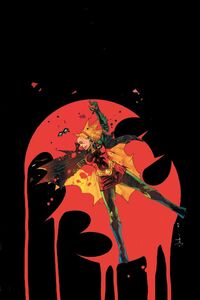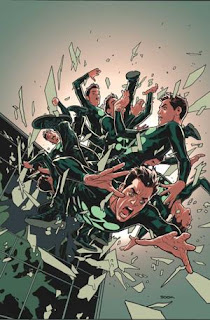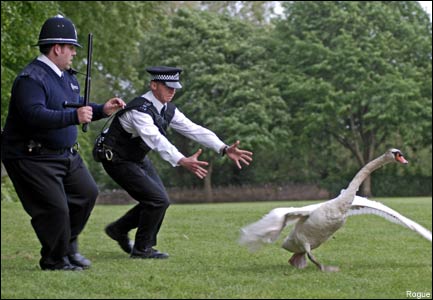
As the team of mutants that is the X-Men has several telepaths (mutants with the power to read minds) the line between thought and reality is frequently blurred. This allows the writers behind the various X-Men comic book series to provide a subtle commentary on thought life, one that seems to very much fit with the Biblical ideas presented by Jesus in the New Testament.
While Professor Charles Xavier (the bald, wheelchair-bound leader and founder of the X-Men) is one of the most well-known X-Men in addition to being the strongest telepath on the planet, it is his students and successors who take center stage in this discussion. The two telepaths that are relevant here are Jean Grey (aka Phoenix, originally Marvel Girl, one of the original X-Men) and Emma Frost (aka the White Queen, former adversary and current co-leader of the X-Men). These two characters are likely the two most powerful telepaths after Xavier (though Jean Grey, as Phoenix is one of the most powerful mutants on the planet...but that's a different story) and have played a vital part in the lives of the X-Men over the years. Aside from their exploits as heroes and occasional villains, these two women manage to have very complex personal lives. Over the years Grey and Frost have been involved in very complicated relationships, the ones here making up what can best be described as a "love-square" (a love-triangle has three sides...so it makes sense that a love-square would have four participants).
Allow me to describe for you this tangled web that seems like it belongs in an episode of some tv show about high school drama (don't get me wrong, I absolutely love all things X-Men, but seriously...this is THAT crazy): Things started out quite simply back in the 1960s when X-Men was first published. Scott Summers (also known as Cyclops, the leader of the X-Men) fell in love with Jean Grey...she returned the feeling. The only real obstacle at this point was Summers' inability to voice his feelings, though he eventually overcame this and initiated the relationship.

When the series was re-launched in 1975, one of today's most popular (if not the most popular) mutants joined the team: Wolverine, the man with the healing factor, animal senses, adamantium claws, and no memory of his past. He quickly developed an attraction for Grey, one that was not returned. That was the way things stood for many years, Scott and Jean together (only interrupted by Grey's death on several occasions, but again, another story...) with Wolverine eventually moving on to others, all the while harboring secret affection for Jean. Then, in the 1990's (keep in mind, that time in the comic book world does not operate in the same way it does in real life, as such the characters are not currently 30-40 years older than their first appearances) things got interesting. For one the White Queen decided to stop being a vilain and joined the X-Men. As yet another telepath on the team, when Cyclops was troubled, he turned to Frost for telepathic therapy...this lead to a 'mental affair' between the two. Years later Jean found herself in a similar situation with Wolverine (most recently detailed in the new series X-Men Forever). Neither Scott nor Jean physically engaged in any adulterous acts, yet the writers of these stories imply that this fact does not excuse them at all.
When Jean finds out about Scott's mental infidelity, their relationship almost ends in divorce. Though the consequences where far less severe upon Scott finding out about her telepathic relationship with Wolverine, he is deeply hurt and the two put much emotional distance between themselves (or at least that is all that had happened before my budget ceased for the allowance of my continued reading of X-Men Forever).
 However, things likely would have been more serious if Cyclops had not found out in the wake of Wolverine's death. What is admirable about the writing in regards to this issue is that no excuses are made, the sins in thought are treated as they would be in the physical realm. The scenario here regarding characters that are telepaths allows for a clear parallel between the situation in these comic books and Jesus' Sermon on the Mount. In Matthew 5:28 Jesus says that "anyone who looks at a woman lustfully has already committed adultery with her in his heart". All sin has its origins in our thoughts, and this is no exception. Jesus makes it clear in this passage and others that our thoughts are important, and we should do our best to guard them. Purity of thought leads to purity of action, and therefore the reverse holds true. The path Christians should take in regards to this matter is two-fold as explained in 2 Timothy 2:22, which states "Flee also youthful lusts: but follow righteousness, faith, charity, peace, with them that call on the Lord out of a pure heart." We should A. avoid sinful thoughts and B. dwell on pure thoughts. This is the only real way one can avoid walking the line that often leads to falling into sin's abyss. As Jesus said, and as the X-Men's telepaths illustrated, there is not enough of a line between thought and action to make one any better than the other.
However, things likely would have been more serious if Cyclops had not found out in the wake of Wolverine's death. What is admirable about the writing in regards to this issue is that no excuses are made, the sins in thought are treated as they would be in the physical realm. The scenario here regarding characters that are telepaths allows for a clear parallel between the situation in these comic books and Jesus' Sermon on the Mount. In Matthew 5:28 Jesus says that "anyone who looks at a woman lustfully has already committed adultery with her in his heart". All sin has its origins in our thoughts, and this is no exception. Jesus makes it clear in this passage and others that our thoughts are important, and we should do our best to guard them. Purity of thought leads to purity of action, and therefore the reverse holds true. The path Christians should take in regards to this matter is two-fold as explained in 2 Timothy 2:22, which states "Flee also youthful lusts: but follow righteousness, faith, charity, peace, with them that call on the Lord out of a pure heart." We should A. avoid sinful thoughts and B. dwell on pure thoughts. This is the only real way one can avoid walking the line that often leads to falling into sin's abyss. As Jesus said, and as the X-Men's telepaths illustrated, there is not enough of a line between thought and action to make one any better than the other.'Nuff Said!
-Cable













































